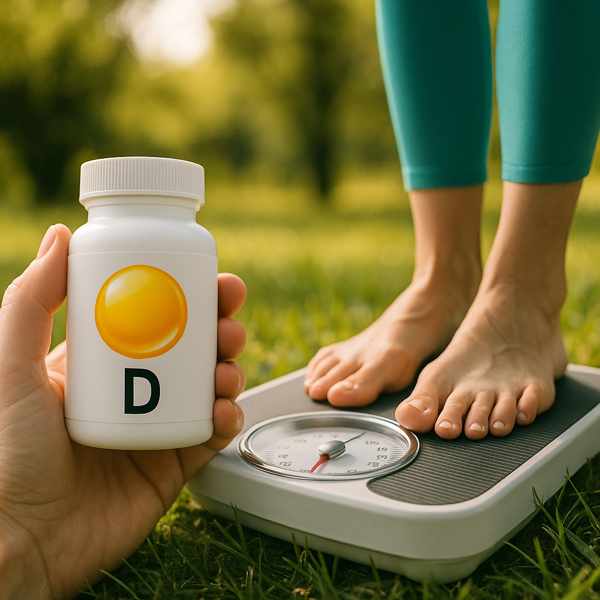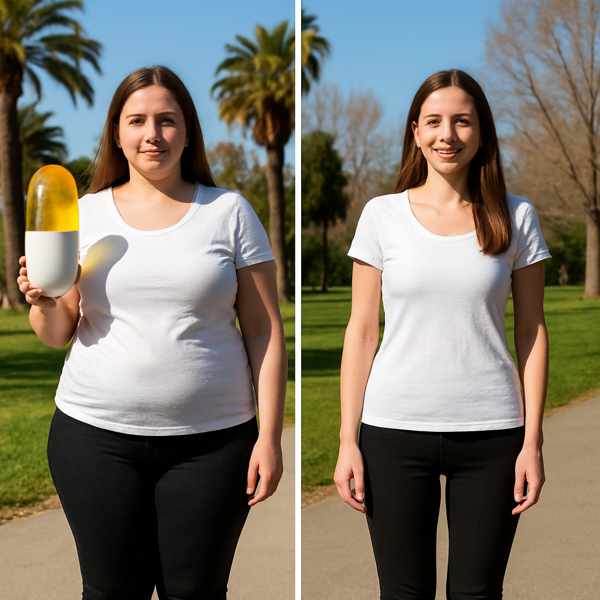Does Vitamin D Help With Weight Loss?
Does vitamin d help with weight loss? Many people want to lose weight. They try to find different ways to do it. Some people wonder if vitamin D can help with weight loss. Vitamin D is important for our bodies. It helps keep bones strong. But does it also help us lose weight? In this article, we will explore that question. We will look at studies and research. We will learn if vitamin D really helps with weight loss.
Understanding Vitamin D and Its Importance
![]()
Vitamin D is a special vitamin. Our bodies need it to stay healthy. Here are some key points about vitamin D:
- It helps our bones stay strong.
- We get it from the sun and some foods.
- It helps our body absorb calcium.
- It’s important for our immune system.
Without enough vitamin D, our bones can become weak. This might lead to problems like osteoporosis. Also, low vitamin D levels might affect how we gain or lose weight.
Does Vitamin D Help with Weight Loss?
![]()
Many studies have looked into vitamin D and weight loss. Here’s what they found:
- Some studies say vitamin D helps with weight loss.
- Other studies say it does not make a big difference.
- The results are not the same for everyone.
For example, in some studies, people took vitamin D supplements. They lost more weight than those who did not take the supplements. But in other studies, there was no difference between the groups.

Can Vitamin D Deficiency Cause Weight Loss?
![]()
Does Vitamin D Cause Weight Gain? Does Vitamin D Help With Weight Gain?
Vitamin D is an essential nutrient that plays a significant role in many bodily functions, including bone health, immune support, and inflammation reduction. However, when it comes to its impact on weight, the relationship is not straightforward. Vitamin D deficiency is generally more associated with weight gain rather than weight loss.
People with low levels of vitamin D might experience weight gain due to a variety of factors. One possibility is that vitamin D deficiency can lead to reduced calcium absorption, which might influence fat cell storage and growth. Additionally, some studies suggest that sufficient levels of vitamin D might help regulate appetite and improve metabolism, factors that can contribute to maintaining a healthy weight.
While vitamin D deficiency itself is not known to directly cause weight loss, it can be a part of a complex set of factors influencing weight management. For individuals experiencing unexplained weight changes, it’s important to consider a range of potential causes, and vitamin D levels could be one aspect to investigate. If someone suspects they have a vitamin D deficiency, they should consult with a healthcare professional who can conduct appropriate tests and suggest possible treatments, such as dietary changes or supplements.
How Vitamin D Might Help You Lose Weight
![]()
There are some ideas about how vitamin D might help with weight loss:
- It might reduce body fat.
- It could lower waist circumference.
- It may help control appetite.
- It might boost metabolism.
These are just theories. More research is needed to know for sure.

Case Studies: Vitamin D Weight Loss Results
![]()
Let’s look at some real-life examples:
One study focused on obese women. They were given vitamin D supplements. After a few months, they lost some weight. Their body mass index (BMI) went down. But not all of them had the same results. Some lost more weight than others.
In another study, postmenopausal women took vitamin D. They were part of a weight loss program. The group taking vitamin D lost more body fat than the placebo group. This shows that vitamin D might help when combined with diet and exercise.

Clinical Trials and Research Findings
![]()
Scientists conduct clinical trials to learn more about vitamin D and weight loss. These trials include:
- Randomized controlled trials
- Studies on different age groups
- Research on both men and women
Some trials show good results. Others do not show much change. For example, a trial at a research center gave people vitamin D daily. After weeks, their body weight was checked. Some lost weight, while others did not.
Challenges in Studying Vitamin D and Weight Loss
![]()
Studying vitamin D and weight loss is not easy. Researchers face challenges like:
- Diverse study groups
- Different dosages of vitamin D
- Various lifestyle factors
These challenges make it hard to draw clear conclusions. Scientists need more studies to understand fully.
Vitamin D Supplementation for Weight Loss
![]()
Some people take vitamin D supplements. This can help if you have low vitamin D. Supplements come in pills or drops. Here’s how they might help:
- They can increase vitamin D levels quickly.
- They might support weight loss efforts.
- They are easy to take every day.
Always talk to a doctor before starting any supplement.
How Does Vitamin D3 and K2 Help With Weight Loss?
![]()
Vitamin D3 and K2 are vitamins that play important roles in the body and may offer some benefits when it comes to weight management, though they aren’t magic weight loss pills on their own. Both vitamins contribute to overall health, which can indirectly support weight loss efforts by improving bodily functions and potentially boosting metabolism.
Vitamin D3, commonly known as the “sunshine vitamin,” is essential for bone health because it helps the body absorb calcium. But beyond that, it also supports the immune system and may have a role in regulating mood and energy levels. Some studies suggest that adequate levels of vitamin D3 can help maintain a healthy weight. This may be because it supports the body’s ability to burn fat and could help reduce the formation of new fat cells. Additionally, people with higher levels of vitamin D3 might find it easier to lose weight as part of a healthy lifestyle that includes diet and exercise.
Vitamin K2 works closely with vitamin D3 to ensure that calcium is used properly in the body. It helps direct calcium to the bones and teeth, where it is needed, and away from the arteries, where it could cause problems. While vitamin K2 isn’t directly linked to weight loss, it supports cardiovascular health, which is important for anyone trying to lose weight and improve overall fitness. A healthy cardiovascular system can enhance your ability to engage in physical activity, which is crucial for burning calories and maintaining a healthy weight.
In summary, while neither vitamin D3 nor K2 is a direct solution for weight loss, they both contribute to overall health and can support your body’s functions in ways that might make losing weight easier. Ensuring you get enough of these vitamins through diet, supplements, or sun exposure can be a helpful part of a broader strategy that includes balanced nutrition and regular exercise. Always consult with a healthcare provider before starting any new supplement regimen, especially if you’re aiming to address weight concerns.
Reactive Protein and Inflammation
![]()
Inflammation plays a role in weight gain. Reactive protein is a marker of inflammation. Here’s how vitamin D might help:
- It can lower reactive protein levels.
- This might reduce inflammation.
- Less inflammation can support weight loss.
Lowering inflammation is good for overall health, too.

Public Health and Obesity Concerns
![]()
Obesity is a big problem in many places. Public health experts worry about it. They look for ways to solve this issue. Vitamin D might be one solution. Here’s why:
- It’s easy to get from sunlight and food.
- Supplements are widely available.
- It has other health benefits, too.
Experts continue to study its effects on obesity and weight loss.
Practical Tips for Boosting Vitamin D Levels
![]()
If you want to boost your vitamin D levels, consider these tips:
- Spend time outside in the sun.
- Eat foods rich in vitamin D like fish and eggs.
- Consider taking supplements if necessary.
- Check your vitamin D levels regularly.
Remember, balance is key. Too much or too little can cause problems.
Sun Exposure and Vitamin D Levels
![]()
Sunlight is a natural source of vitamin D. Spending time outside can help your body produce it. Here’s how sun exposure relates to vitamin D and weight:
- More sun means higher vitamin D levels.
- Higher levels might help with weight management.
- People in sunny places often have better vitamin D levels.
But too much sun can be harmful. Always protect your skin when you are outside.

Vitamin D Weight Loss Before and After
How Much Vitamin D Should I Take to Lose Weight?
![]()
How Much Vitamin D to Lose Weight?
Vitamin D is an essential nutrient that plays a crucial role in maintaining bone health, supporting the immune system, and more recently, it has been linked to weight management. While there is no magic pill for losing weight, some studies suggest that maintaining adequate levels of vitamin D might support weight loss efforts. However, the connection between vitamin D and weight loss is not fully understood, and taking vitamin D alone is unlikely to lead to significant weight loss.
First, it’s important to know that the recommended daily intake of vitamin D varies depending on age, sex, and other factors. For most adults, the general recommendation is about 600 to 800 international units (IU) per day. Before making any changes to your vitamin D intake, it’s a good idea to get your vitamin D levels checked by a healthcare provider. If you’re deficient, your doctor may recommend a higher dose to bring your levels up to a healthy range.
Some research suggests that people with higher levels of vitamin D tend to have a lower body mass index (BMI) and less body fat. However, this does not necessarily mean that taking extra vitamin D will help you lose weight. Instead, vitamin D might play a supporting role by helping regulate hormones that influence appetite and fat storage, or by enhancing the effectiveness of weight loss strategies like diet and exercise.
In summary, while ensuring you have adequate vitamin D levels is important for overall health, it should not be seen as a standalone solution for weight loss. A balanced diet, regular physical activity, and other healthy lifestyle changes are key to losing weight effectively. If you’re considering taking vitamin D supplements to aid with weight loss, it’s best to consult with a healthcare professional to determine the appropriate dosage for your individual needs.
50,000 IU Vitamin D and Weight Loss: Does High-Dose Supplementation Help You Shed Pounds?
![]()
50 000 Iu Vitamin D Weight Loss – Vitamin D 50000 Iu Weight Loss
Recently, there has been growing interest in the potential link between high-dose vitamin D supplementation and weight loss. Some people are curious about whether taking 50,000 IU (International Units) of vitamin D can help them shed pounds and enhance their weight loss efforts.
Taking 50,000 IU of vitamin D is considered a high dose and should generally be approached with caution. The recommended daily allowance for adults is typically around 600 to 800 IU, depending on age and other factors. High doses of vitamin D over an extended period can lead to toxicity, with potential side effects such as nausea, vomiting, weakness, and more serious health issues like kidney damage. Therefore, anyone considering high-dose vitamin D supplementation for weight loss should consult with a healthcare professional to ensure it is safe and appropriate for their individual health needs.
In summary, while there is some interest in the potential weight loss benefits of high-dose vitamin D, the evidence is not conclusive. More research is needed to fully understand the relationship between vitamin D and weight management. For those looking to lose weight, it is generally recommended to focus on a balanced diet, regular physical activity, and other proven strategies, while using supplements under the guidance of a healthcare provider.
Magnesium and Vitamin D for Weight Loss
![]()
Magnesium and Vitamin D are two nutrients that play important roles in maintaining overall health, and there is interest in how they might contribute to weight loss. While neither is a magic solution for shedding pounds, they can support weight loss efforts when combined with a balanced diet and regular exercise.
Magnesium is a mineral that is crucial for many bodily functions, including muscle and nerve function, blood sugar control, and energy production. It helps regulate blood glucose levels and insulin, which are important for maintaining a healthy weight. When magnesium levels are sufficient, the body can better manage blood sugar, potentially reducing cravings and the tendency to overeat. Additionally, magnesium supports restful sleep, which is essential for weight management, as poor sleep can lead to weight gain.
Vitamin D, on the other hand, is a fat-soluble vitamin that is important for bone health and immune function. It also plays a role in mood regulation and muscle function. There is some evidence suggesting that adequate levels of vitamin D may support weight loss. For example, vitamin D can enhance the effectiveness of leptin, a hormone that signals to your brain that you are full. People with higher levels of vitamin D may have an easier time controlling their appetite and reducing calorie intake.
While both magnesium and vitamin D have potential benefits for weight loss, it’s important to approach them as part of a holistic lifestyle change. Simply taking supplements without making other changes to diet and physical activity is unlikely to produce significant weight loss. Before starting any supplement regimen, it’s always a good idea to consult with a healthcare provider to ensure it’s appropriate for your individual health needs.
What Vitamins Help With Weight Loss After 40?
![]()
As we age, maintaining a healthy weight can become more challenging due to metabolic changes and other factors. For those over 40, ensuring an adequate intake of certain vitamins can support weight management efforts, although it’s important to remember that vitamins alone won’t lead to weight loss. They can, however, contribute to overall health and make it easier to stick to a weight loss plan.
One important vitamin for those over 40 is Vitamin D. This vitamin plays a crucial role in bone health and immune function, and there is some evidence to suggest it may also aid in weight management. Low levels of Vitamin D have been associated with increased body fat and difficulty losing weight. As people age, the ability to synthesize Vitamin D from sunlight decreases, so it’s important to ensure adequate intake through diet or supplements.
Another essential group of vitamins are the B vitamins, including B6, B12, and folate. These vitamins are key players in metabolism, helping the body convert food into energy. They also support brain function and energy levels, which can be beneficial for staying active and motivated in weight loss efforts. As we get older, our ability to absorb B12 decreases, making supplementation or fortified foods a wise choice.
Vitamin C is also worth mentioning. While it’s widely known for its immune-boosting properties, Vitamin C can also support metabolism and help the body burn fat more efficiently. Additionally, it plays a role in repairing tissues and maintaining skin health, which can be beneficial as aging skin tends to lose elasticity.
Finally, while not a vitamin, Omega-3 fatty acids deserve a mention. These healthy fats, found in fish oil and certain plant oils, can help reduce inflammation and may support weight loss by improving insulin sensitivity and reducing appetite.

Conclusion: Does Vitamin D Help with Weight Loss?
![]()
So, does vitamin D help with weight loss? The answer is not simple. Some studies say yes, while others do not. Vitamin D might help some people lose weight, especially if they have low levels. It could work best with a healthy diet and exercise. More research is needed to know for sure. If you think you have low vitamin D, talk to a doctor. They can guide you on the best steps to take. Remember, staying healthy is most important.
References
- Vitamin D supplementation with weight loss diet in obese individuals: a randomized double-blind clinical trial.
https://pubmed.ncbi.nlm.nih.gov/30246883/ - The effects of vitamin D supplementation on weight loss and body composition in overweight and obese women.
https://www.ncbi.nlm.nih.gov/pmc/articles/PMC6071442/ - Effect of Vitamin D3 Supplementation in Combination With a Weight Loss Program on Biomarkers of Inflammation in Postmenopausal Women.
https://aacrjournals.org/cancerpreventionresearch/article/8/7/628/50412/Effect-of-Vitamin-D3-Supplementation-in